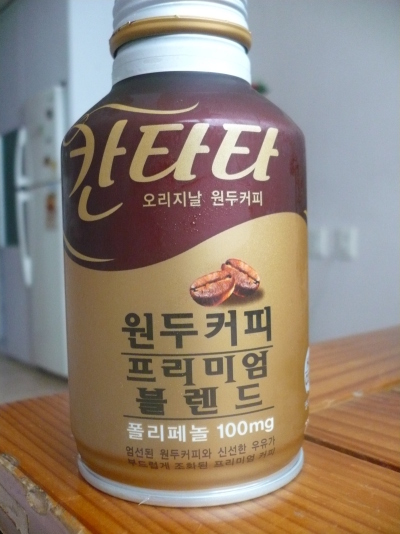Konglish (Koreanized English, sometimes also called Engrish, though that term also includes Japanized English, and I don’t really like that term) permeates Korean popular culture, especially in the spheres of marketing. Konglish exists at several different levels, from more-or-less correct English messages attached to advertising, to random English words or pseudo-English words plastered on t-shirts, to “hangeulized” English in the form of minimally adapted loanwords into Korean, and especially used as product names and brand names.
Many examples of “hangeulized” English (i.e. English written using the Korean writing system, and adapted therefore to Korean phonology) can be found on the shelves of the grocery store. Here is an example:

This is a brand of iced coffee that I buy. The cursive-looking hangeul at the top spells out “Kantata” (i.e. Cantata, as in a piece of music), then right under that in smaller letters it says “orijineol wondu keopi” (original wondu coffee). The phrase “wondu keopi” repeats under the coffee beans picture, and then it says “peurimieom beullendeu pollipenol 100 mg” (premium blend polyphenol 100mg). See how that works?
Ok, actually what I want to write about is what appears to be an emerging related phenomenon, which is the use of “hangeulized” French, also in marketing. The advantages seem to be a) French has a novelty factor, while English is rather worn out, b) French has the same high-social-status element that English does, but with less historical and geopolitical baggage (at least here in Korea – don’t try this in e.g. Vietnam).
What’s really interesting, to me, is the subtle way that the French phonological system, as represented using the Latin alphabet, is hangeulized differently for a given etymon than would be done for an identical word in English. Here is a bakery that just opened a few blocks west of here (and note the use of perfectly acceptable English in the supporting text to the brand-name):

The sign’s hangeul reads “bon geurang bageteu” (which is bon grand baguette in French – bad French, actually, since it messes up the gender agreement between the adjectives and the noun, I think). The word “grand” is common enough in both French and English, and if it were an English word being hangeulized, they’d do something more along the lines of “geuraendeu,” but, because it’s French, they capture the different quality of the french vowel, along with the nasalized ending, by doing it as “geurang.”
I’m sure very few people find this as fascinating as I do. I can’t make excuses for my stupid interests. But I’ve decided this hangeulized French needs a name, along the lines of the term Konglish. And I think “Hançais” is just perfect – “han” meaning Korean (in Korean), and -çais for the French part, of course.
![]()

Your analysis of Konglish and Hancais is tres magnifique. You should compile a lexicon of such inter language borrowings, applying your prodigious neologistic talents as appropriate.
One comment on your favorite iced coffee. It seems likely to me that the brand takes its name from Bach’s Cantata No. 212, “Schweigt stille, plaudert nicht,” commonly known as the “Coffee Cantata” because the comic libretto concerns a young woman who is addicted to coffee (a new middle class obsession in Germany during the early 18th century). I assume that the promoters of your Korean coffee are drawing upon the widespread appreciation of Western classical vocal music among Koreans–at least that seems plausible to me–what do you think? If you save me a bottle, I’ll display it in my office.
Hi, Jared!
How would souvenir translate into Hancais? (sorry for the lack of cedille—must learn to do those things on email).
We miss you and your musings!